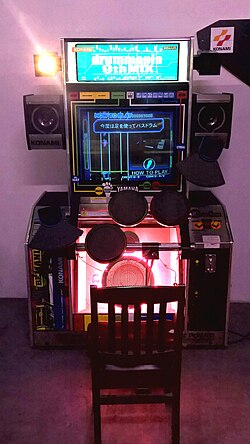Drummania
| DrumMania | |
|---|---|

DrumMania 9thMix arcade game
|
|
| Developer(s) | Bemani |
| Publisher(s) | Konami Digital Entertainment, Inc. |
| Platform(s) | Arcade, PlayStation 2 |
| Release | 1999 |
| Genre(s) | Music |
| Mode(s) | Single player (Can be linked with other Guitarfreaks cabinets) |
| Arcade system | System 573 (until V), Bemani Python 2 (until V4), Windows XP-based (as of V4) |
| Display | Raster, standard resolution, horizontal |
DrumMania (ドラムマニア Doramumania?) is a drumming music video game series produced by Bemani, the musical division of Konami Digital Entertainment, Inc..
Drummania was first released in 1999 as an arcade game, then subsequently ported to the Sony PlayStation 2 in Japan in 2000 as a launch title. Subsequent mixes have been released approximately once a year. In 2010, a series XG was introduced, adding a floor tom, left cymbal and left pedal to the cabinet setup. To focus on the new game, development ceased for the original version, with the last mix V8 released in 2011. The most recent arcade version is DrumMania XG2, which was released on March 9, 2011.
The game can be linked to its guitar-version sibling Guitarfreaks, allowing for cooperative play as long as they are from the same release. Earlier versions of the game could also be linked with Keyboardmania. From 7th mix onwards, the game has been linked to Konami's e-Amusement system, allowing for online competitive play.
DrumMania simulates real life drumming. It is played using a controller designed to imitate a drum set. Five pads are arrayed from left to right for the hi-hat, snare drum, high tom, low tom, cymbal and bass drum. On XG series, a left cymbal, left pedal and a floor tom are added. During play, the player presses the pads and steps on the pedal in sync with the notes falling vertically from the top of the screen in time with the music.
The player's accuracy is judged for each note played, and while the individual note judgments have changed throughout the series, the current system uses Perfect, Great, Good, Poor, and Miss to evaluate performance of each note. Ratings of Poor or Miss will deplete the player's "Excite Gauge", while accurate play will replenish it. If the Excite Gauge is emptied completely, the game ends. Players will be able to play anywhere from three to five songs depending on the game's configuration, with the potential to earn one or two additional stages in certain versions of the game if performance is good enough. At the completion of a song, players are given a letter rank for their performance which can range anywhere from E to A, as well as S and SS depending on how well the song was played, and how the particular release of the game being played computes ranks.
...
Wikipedia
